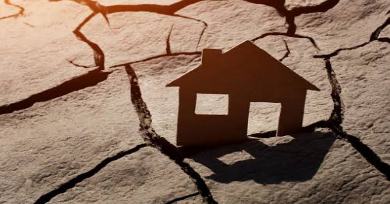What is earthquake insurance how does it work
Earthquake insurance is a type of insurance policy that provides coverage for damage to your property and personal belongings caused by an earthquake. This insurance policy covers losses resulting from ground shaking, landslide, ground rupture, or other types of seismic activity.
The Necessity of Earthquake Insurance
Seismic events possess the capacity to inflict severe destruction on real estate and personal property, possibly plunging homeowners into financial turmoil. Standard homeowner's insurance policies generally exclude coverage for damages stemming from earthquakes, rendering earthquake insurance a crucial element in the protection of one's assets.
The Significance of Earthquake Insurance
While earthquakes possess the potential to occur anywhere, certain regions exhibit a heightened susceptibility to seismic activity. Property owners residing in these areas should contemplate obtaining earthquake insurance to safeguard their assets and real estate. Earthquake insurance provides financial defense against the expenses associated with repairing or rebuilding in the aftermath of an earthquake, thereby ensuring peace of mind and long-term stability.
Earthquake Insurance Policy Varieties
A diverse array of earthquake insurance policies exists, enabling customization to accommodate your unique requirements:
1. Dwelling coverage: Addresses the expenses associated with repairing or reconstructing your residence following an earthquake.
2. Additional living expenses coverage: Assists in covering the expenses of temporary housing and living costs if your residence becomes uninhabitable due to earthquake damage.
Components Influencing Earthquake Insurance Costs
Various factors contribute to the cost of earthquake insurance, including:
Geographic Location
The likelihood of earthquakes in your region substantially impacts the cost of coverage. Properties in high-risk areas typically incur higher premiums compared to those in regions with lower risk.
Age and Construction of the Building
Newer residences constructed using modern techniques and materials typically exhibit greater resistance to earthquake-induced damage, resulting in lower premiums. Additionally, wooden homes generally withstand earthquakes more effectively than masonry structures, leading to reduced insurance costs.
Deductibles and Limitations on Coverage
Selecting a higher deductible or lower coverage limit can contribute to a decrease in your earthquake insurance policy's cost. However, achieving a balance between affordability and sufficient protection is essential.
Acquiring Earthquake Insurance
You may obtain earthquake insurance through your existing homeowner's insurance provider or a specialized earthquake insurance company. To identify the most suitable policy for your needs, compare multiple quotes and coverage options and consult with an insurance agent or broker.
Recommendations for Reducing Earthquake Insurance Expenses
1. Retrofit your residence to enhance its earthquake resistance, potentially leading to lower premiums.
2. Bundle your earthquake insurance with other policies, such as homeowner's or auto insurance, to receive a discount.
Submitting a Claim Following an Earthquake
If your home incurs damage due to an earthquake, promptly contact your insurance provider to file a claim. Thoroughly document the damage by taking photos or recording videos, and provide a comprehensive inventory of lost or damaged items. Retain all receipts for repairs and temporary living expenses to support your claim. Typically, your insurance company will dispatch an adjuster to evaluate the damage and ascertain the appropriate compensation.
Understand the Coverage Limits
Insurance policies typically have separate coverage limits for your dwelling, personal property, and additional living expenses. Make sure you understand the maximum amount your policy will pay for each category and determine whether these limits are adequate for your needs.
Consider the Cost of Rebuilding or Repairing
When selecting coverage limits, consider the cost of rebuilding or repairing your home in the event of an earthquake. Ensure that the coverage limits you choose reflect the current value of your home and account for potential increases in construction costs over time.
Prepare an Earthquake Emergency Plan
This plan should include:
1. Establishing safe spots within your home where you can take cover during an earthquake.
2. Creating an emergency supply kit with essentials like food, water, medication, and a first aid kit.
3. Developing a communication plan to stay in touch with family members if you become separated during an earthquake.
Earthquake Insurance Coverage Exclusions
Some common exclusions consist of:
1. Damage to land, such as sinkholes, erosion, or landslides.
2. Damage to vehicles, which should be covered under your auto insurance policy.
3. Damage resulting from floods, even if the flood occurred due to the earthquake. Separate flood insurance policies may be necessary to obtain coverage for such instances.
Government's Role in Earthquake Insurance
In certain regions, governments offer earthquake insurance programs to assist homeowners in acquiring coverage. These initiatives, like the California Earthquake Authority (CEA) in the United States, provide affordable, standardized policies to residents in high-risk zones. If you reside in an area with a government-administered earthquake insurance program, consider exploring their coverage options.
Concluding Thoughts
Comprehending the factors affecting policy costs and the distinct types of coverage available, you can make an informed decision and ensure your home and possessions are adequately protected. Remember to consult with an insurance professional and investigate government programs for additional support.
Frequently Asked Questions
1. Is earthquake insurance mandated by law?
No, earthquake insurance is typically not required by law. However, some mortgage lenders may mandate it in high-risk regions.
2. What is the typical cost of earthquake insurance?
Earthquake insurance costs vary depending on factors such as location, building age and construction, and the coverage limits and deductibles you select.
3. Can renters acquire earthquake insurance?
Yes, renters can obtain earthquake insurance to cover their personal belongings and additional living expenses if their rental property suffers damage.
4. Do any alternatives to earthquake insurance exist?
While no direct alternatives to earthquake insurance are available, preventive measures like retrofitting your home can help minimize potential damages.
